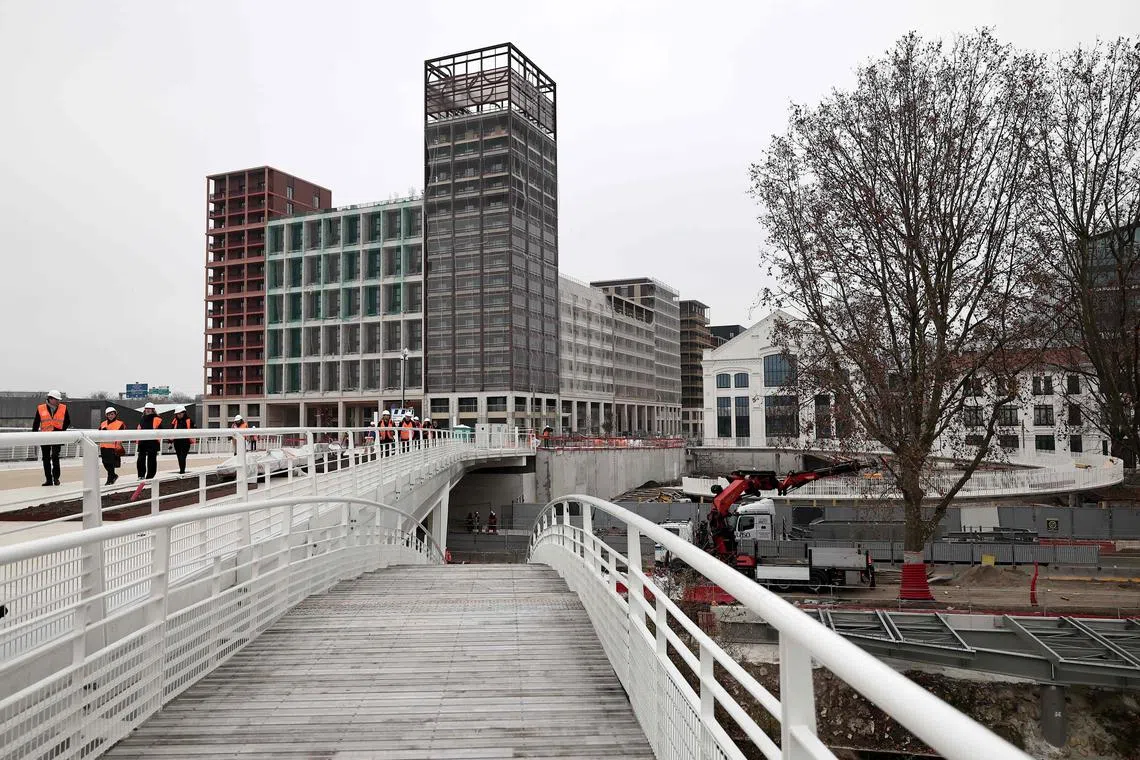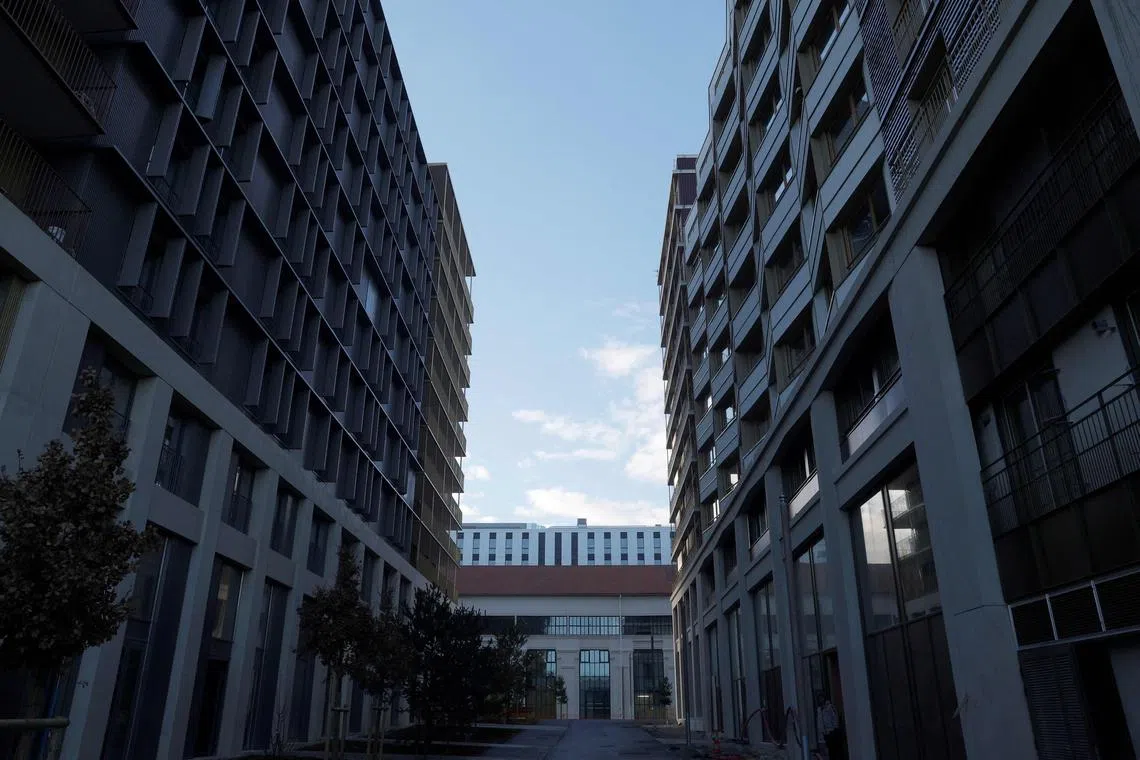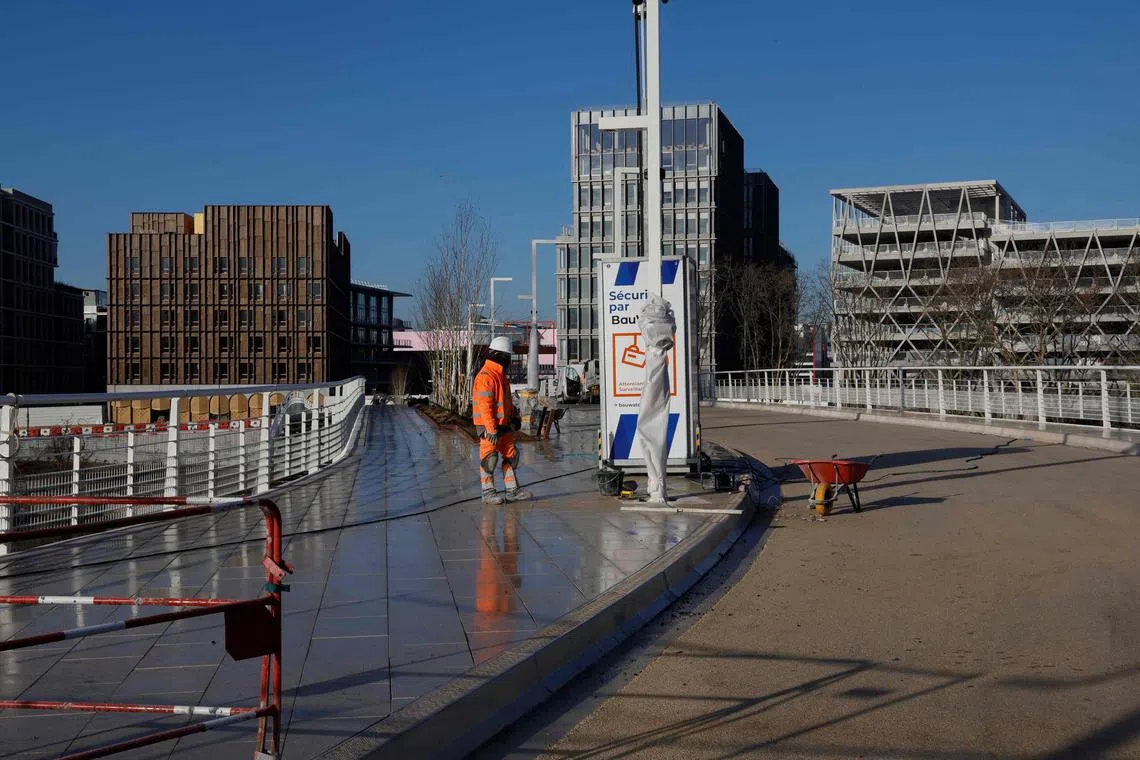Paris’ grittiest suburb awaits Olympics dividend
Sign up now: Get the biggest sports news in your inbox

The construction site of the Olympic Village in Saint-Ouen, north of Paris.
PHOTO: AFP
Follow topic:
PARIS – From the windows of Les Bons Vivants cafe, a short walk from the athletes’ village for the Paris Olympics,
Next door, the makeover of the 130-metre Tour Pleyel skyscraper is nearly complete, turning the 1970s eyesore into a modern landmark that will host a four-star hotel and a pool with panoramic views.
Its private owner started the €500 million (S$728.2 million) renovation in anticipation of an Olympics dividend for the Saint-Ouen-sur-Seine area, which has been a focus of public investment for the July 26-Aug 11 Paris Games.
Around the corner from the cafe, a newly completed apartment block with a modern facade of concrete and wood stands opposite relics of the past – scruffy two-storey brick buildings hosting garages and kebab shops.
A brand-new station – Saint-Denis Pleyel – is also emerging from a mass of cranes and scaffolding, set to one day be a hub for four metro lines and 250,000 daily travellers.
“It’s taking time but after the Games, it’s going to be good,” said Ethan, a 28-year-old waiter at Les Bons Vivants. “As soon as they’re finished, all the infrastructure will be for the town.”
The emerging modernity outside contrasts with life inside the bar. With its formica tables, old wooden bar and staff in traditional black waistcoats and white aprons, time appears to have stood still.
The meeting of the new and old in Saint-Ouen is causing some tensions and fears, Ethan admits.
“House prices have gone crazy and it’s going to change the population, it’s undeniable,” he said.
Saint-Ouen lies just to the north of Paris, separated from the capital by the ring road that divides the generally wealthy and mostly white centre of the city from its more deprived, immigrant-heavy suburbs.
Known for its 150-year-old flea market and for once hosting the famed Pleyel piano factory, Saint-Ouen is also associated with the modern scourges of Paris’ suburbs – run-down tower blocks and drug-dealing.
The decision to place the athletes’ village there and extend two metro lines into the area – another three are planned in the future – was part of the pitch for the Paris Games, which French authorities won in 2017.
Just as the 2012 London Olympics helped regenerate the eastern Stratford area of the British capital, Paris organisers believe their Games will help develop Saint-Ouen and the surrounding areas of the notorious Seine-Saint-Denis district.

Buildings at the construction site of the 2024 Olympic Villlage in Saint-Denis, north of Paris on Jan 15.
PHOTO: AFP
“I guess we’re part of the gentrification process,” admits local resident Maite Gallen, 37, a psychologist who moved to Saint-Ouen from Paris with her husband “to have a bit more space”.
“In terms of the impact of the Games, I’m sceptical,” she added. “I guess it’s a good thing overall, but they came here and did a big presentation about the future ‘international attractiveness’ of Saint-Ouen which made me laugh.
“We’re not quite there yet. You can’t even find a supermarket nearby.”
She hopes, though, the new village that will house competitors and officials for the Games will bring positive changes.
The giant complex has seen private developers build nearly 3,000 new apartments that will become a mix of private, student and public housing once the Olympics and Paralympics have ended.

Workers on the construction site of the 2024 Olympic Villlage in Saint-Denis, north of Paris on Jan 15.
PHOTO: AFP
The ground-floor spaces of the eco-friendly blocks will be given over to new commercial spaces, including shops.
A kilometre away lies the Stade de France – which will host the athletics events – which is undergoing a makeover 26 years after its inauguration.
Synchronised swimming, diving and water polo will take place in a new aquatics centre opposite.
But in a reminder of local crime problems, two teenagers were stabbed and beaten to death last week just to the north in the historic Saint-Denis area.
“I hope the Olympics are going to offer up another image of Saint-Denis,” said retired lawyer Malika Madjour, whose parents moved to France during the first major wave of North African immigration in the 1940s and 50s.
“It’s an extraordinary opportunity for the town.” AFP

